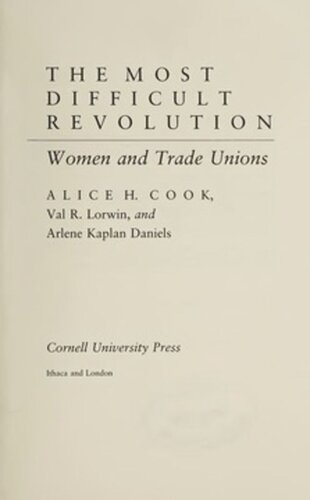

Most ebook files are in PDF format, so you can easily read them using various software such as Foxit Reader or directly on the Google Chrome browser.
Some ebook files are released by publishers in other formats such as .awz, .mobi, .epub, .fb2, etc. You may need to install specific software to read these formats on mobile/PC, such as Calibre.
Please read the tutorial at this link: https://ebookbell.com/faq
We offer FREE conversion to the popular formats you request; however, this may take some time. Therefore, right after payment, please email us, and we will try to provide the service as quickly as possible.
For some exceptional file formats or broken links (if any), please refrain from opening any disputes. Instead, email us first, and we will try to assist within a maximum of 6 hours.
EbookBell Team

0.0
0 reviewsOver half the women in the United States are now employed outside the home, and the proportions are comparable in many European countries. Yet nowhere has this revolution in the composition of the labor force been followed by the triumph of a more difficult revolution—the struggle for full equality in the rights and roles of women. Building upon research begun by the late Val R. Lorwin and Alice H. Cook, Cook and Arlene Kaplan Daniels survey recent efforts of trade unions in Germany, Austria, Sweden, and Great Britain to ensure equal opportunity in the workplace. In identifying the successes and setbacks of the European experience, the authors consider the implications for change in the agendas of American unions. Cook and Daniels show how unions in the countries studied have promoted women's equality through the channels of internal policy, collective bargaining, and political influence. They provide rich cross-cultural comparisons of patterns of government involvement, the extent of women's participation in the unions, education of women for union leadership, access to vocational training, pay equity, the conditions of part-time work, and workplace health and safety concerns. The Most Difficult Revolution will be a vital resource for comparatists in the fields of women's studies, labor studies, political science, anthropology, sociology, and economics.